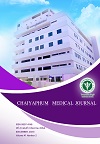The effect of Favipiravir on Liver Function Tests of COVID-19 patients in Nongsaeng Hospital, Udonthani Province.
Keywords:
COVID-19, favipiravir, liver function testsAbstract
Objective: This retrospective descriptive study aimed to determine the level of liver function test after COVID-19 patients who received treatment with favipiravir.
Method: The study population consisted of 58 COVID-19 patients in Nongsaeng Hospital between April – August 2021 who receiving favipiravir treatment, adults (at least 18 years), SARs-CoV-2 RT PCR positive and liver function test before and after at day 4 treatment with favipiravir. Data were analysed using descriptive statistics.
Result: The results showed COVID-19 patients who received favipiravir treatment that ALT < ULN 63.79%, ALP < ULN 93.10% and total bilirubin < ULN 98.28%. There were not patients who received favipiravir treatment that ALP and total bilirubin > 2ULN and ALT > 4ULN.
Conclusion: This study showed most pateints who received favipiravir treatment had normal liver function test, no drug induced liver injury.
References
Wang L, Wang Y, Ye D, Lui Q. Reviewofthe 2019 novelcoronavirus (SARS-CoV-2) basedoncurrentevidence. Int J AntimicrobAgents, 2020; 55(6):105948.
พระราชบัญญัติโรคติดต่อ พ.ศ. 2558. ราชกิจจานุเบกษา เล่มที่ 132, ตอนที่ 86 ก (ลงวันที่ 8 กันยายน 2558).
กระทรวงสาธารณสุข. ประกาศกระทรวงสาธารณสุข (ฉบับที่3) พ.ศ.2563 เรื่อง ชื่อและอาการสำคัญของโรคติดต่ออันตราย.ราชกิจจานุเบกษา เล่มที่ 137, ตอนที่ 48 ง ฉบับพิเศษ (ลงวันที่ 29 กุมภาพันธ์ 2563).
โชติรัตน์ นครานุรักษ์, ฐิตวดี ประดับคำ, วรรษา เจริญไวยเจตน์, เบญจพร วีระพล. เภสัชบำบัดในผู้ป่วยโรคติดเชื้อไวรัสโคโรนา 2019. [อินเทอร์เน็ต]. 2563 [เข้าถึงเมื่อ 28 กรกฎาคม 2564]. เข้าถึงได้จาก: https://ccpe.pharmacycouncil.org/index.php?option=article_detail&subpage=article_detail&id=802.
Instiaty, Darmayani IGAAPS, Marzuki JE, Angelia F, William, Siane A, et al. Antiviral treatment of COVID-19: a clinical pharmacology narrative review. Med J Indones. 2020;29(3):332-45.
Joshi S, Parkar J, Ansari A, Vora A, Talwar D, Tiwaskar M, et al. Role of favipiravir in the treatment of COVID-19. Int J Infect Dis, 2021;102:501-8.
แนวทางเวชปฏิบัติ การวินิจฉัยดูแลรักษา และป้องกันการติดเชื้อในโรงพยาบาล กรณีผู้ป่วยติดเชื้อไวรัสโคโรนา 2019 (COVID-19) สำหรับแพทย์และบุคลากรสาธารณสุข. ฉบับปรับปรุง. วันที่ 17เมษายน พ.ศ. 2564 ประเทศไทย [อินเทอร์เน็ต]. 2564 [เข้าถึงเมื่อ 4 กันยายน 2564]. เข้าถึงได้จาก: https://ddc.moph.go.th/viralpneumonia/file/g_health_care/g04_CPG170464.pdf
Kaur RJ, Charan J, Dutta S, Sharma P, Bhardwaj P, Sharma P, et al. Favipiravir use in COVID-19: Analysis of suspected adverse drug events reported in the WHO database. Infect Drug Resist, 2020;13:4427-38.
รัชนีพร ชื่นสุวรรณ. โรคโคโรนาไวรัส 2019 (COVID-19) ในด้านระบบทางเดินอาหารและตับ. บูรพาเวชสาร, 2563;7(1):113-26.
Agrawal U, Raju R, Udwadia ZF. Favipiravir: A new and emerging antiviral option in COVID-19. Med J Armed Forces India, 2020;76(4):370-6.
Dabbous HM, Abd-Elsalam S, El-Sayed MH, Sherief AF, Ebeid FFS, Soliman S, et al. Efficacy of favipiravir in COVID-19 treatment: a multi-center randomized study. Archives of Virology, 2021;166(3):949-54.
Doi Y, Hibino M, Hase R, Yamamoto M, Kasamatsu Y, Hirose M, et al. A prospective, randomized, open-label trial of early versus late farvipiravir therapy in hospitalized patients with COVID-19. Antimicrob Agents Chemother, 2020;64(12):e01897-20.
Yamazaki S, Suzuki T, Sayama M, Nakada T, Igari H, Ishii I. Suspected cholestatic liver injuryinduced by favipiravir in patient with COVID-19. J Infect Chemother, 2021;27(2):390-2.
ปาจรีย์ ศรีอุทธา. การบาดเจ็บที่ตับเนื่องจากยา.ThaiBullPharmSci, 2560;12(2):69-83.
Olry A, Meunier L, Delire B, Larrey D, Horsmans Y, Le Louet H. Drug-induced liver injury and COVID-19 infection: the rules remain the same. Drug Saf, 2020;43(7):615–617.
Sodeifian F, Seyedalhosseini ZS, Kian N, Eftekhari M, Najari S, Mirsaeidi M, et al. Drug-Induced Liver Injury in COVID-19 Patients: A Systematic Review. Front Med, 2021;8:731436.
พรรณี ลีลาวัฒนชัย, ธนานันต์ตัณฑ์ไพบูลย์. Favipiravir สำหรับรักษาโรคติดเชื้อไวรัสโคโรนา 2019. วารสารเภสัชกรรมโรงพยาบาล, 2564;31(2):141-57.
ยุคล จันทเลิศ. ยาน่ารู้ Favipiravir. วารสารศูนย์การศึกษาแพทยศาสตร์คลินิก โรงพยาบาลพระปกเกล้า, 2564;38(2):232-6.
Kawasuji H, Tsuji Y, Ogami C, Takegoshi Y, Kaneda M, Murai Y, et al. Association between high serumfavipiravir concentrations and drug-induced liver injury. [Internet]. 2021 [cited 2021 Jul 28]. Available from: https://www.medrxiv.org/content/10.1101/2021.05.03.21256437v1.full.pdf.
Udwadia ZF, Singh P, Barkate H, Patil S, Rangwala S, Pendse A, et al. Efficacy and safety of favipiravir, an oral RNA-dependent RNA polymerase inhibitor, in mild-to-moderate COVID-19: A randomized, comparative, open-label, multicenter, phase 3 clinical trial. Int J Infect Dis, 2021;103:62-71.
Doi Y, Kondo M, Matsuyama A, Ando M, Kuwatsuka Y, Ishihara T. Preliminary report of the Favipiravir observational study in Japan (2020/5/15) [internet]. 2020 [cited 2021 Aug 10]. Available from:https://www.kansensho.or.jp/uploads/files/topics/2019ncov/covid19_casereport_en_200529.pdf.
Downloads
Published
Issue
Section
License
Copyright (c) 2021 Chaiyaphum Medical Journal : ชัยภูมิเวชสาร

This work is licensed under a Creative Commons Attribution-NonCommercial-NoDerivatives 4.0 International License.





